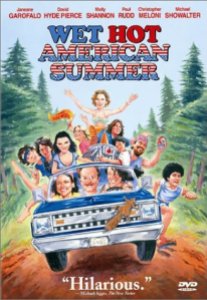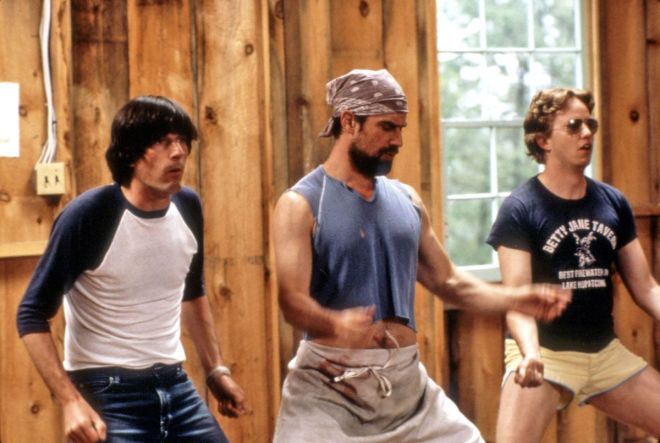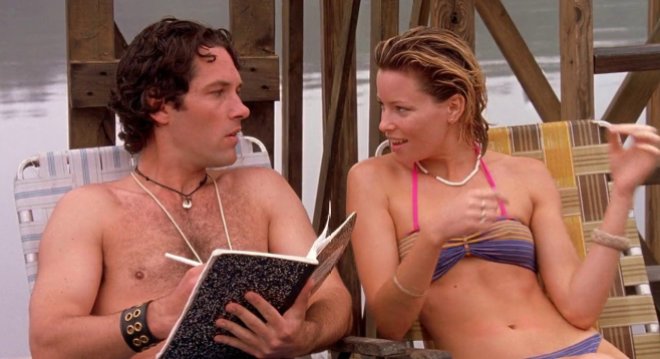David Wain’s summertime parody was far ahead of its time, even in the early 2000s.
 14 years is an awful long time in the 21st Century. In 2001, the first iPod would just be released, and the memes, texts, emojis and general sense of irony we now freely use as communication were hardly even a concept. “Wet Hot American Summer”, David Wain’s cult comedy debut from 2001, may have been released in the new millennium, but its reception was pure ’90s, practically unprepared for the style of irreverence Wain brought to the table. Roger Ebert turned his review into a cheap rendition of “Camp Granada”, while others simply found it profoundly unfunny, if not disturbing.
14 years is an awful long time in the 21st Century. In 2001, the first iPod would just be released, and the memes, texts, emojis and general sense of irony we now freely use as communication were hardly even a concept. “Wet Hot American Summer”, David Wain’s cult comedy debut from 2001, may have been released in the new millennium, but its reception was pure ’90s, practically unprepared for the style of irreverence Wain brought to the table. Roger Ebert turned his review into a cheap rendition of “Camp Granada”, while others simply found it profoundly unfunny, if not disturbing.
Thankfully, Wain’s film has aged better than anyone could have anticipated, to the point that just this month an extended TV series set on the first day at Camp Firewood rather than the last day, was released on Netflix. It’s an incredible feat namely because of how the massive ensemble cast has ballooned in fame and popularity in those 14 years: Janeane Garofolo, Amy Poehler, Paul Rudd, Michael Ian Black, Michael Showalter, Christopher Meloni, David Hyde Pierce, Molly Shannon, Elizabeth Banks, Bradley Cooper (are you kidding me?)! I haven’t even begun to scratch the surface.
But “Wet Hot American Summer” is random, meta and absurd in a way that never fit the template of the times and could only exist in an Internet age. It’s an assortment of characters, vignettes and broad set pieces that don’t add up to a complete plot, but it doesn’t play like a sketch movie in the slightest. It doesn’t play like a “Family Guy” half hour of cutaways, one-liners and non-sequiturs. And it isn’t even pure anarchy (well, for most of the run time).

One of the most revealing scenes in all of Wain’s film takes place on a trip into town away from camp. An ’80s rock song plays over a montage as the counselors and teens tag along in the back of a pick-up. It’s a fun, shooting the breeze diversion from the rest of the film, with a few quick glimpses of everyone dancing and eating burgers and smoking weed. Without a moment’s change in tone, the image on screen devolves into chaos. The kids are buying cocaine, then have transformed into skinny, lifeless junkies shooting up heroin in a random shambles of an apartment. The song ends, and so does the scene. Things return to normal, and no one bothers to comment on what we’ve just seen.
Throughout “Wet Hot American Summer”, Wain realizes he can play with genre and tone with no consequences. As long as the flow and the spirit of this otherwise wholesome movie never wavers, he can show whatever he wants, whether it’s a gay sex scene between Cooper and Showalter, or a “Rocky” training montage between Meloni and Showalter. Shannon’s character seems divorced from the movie entirely, with her classroom of arts and crafts students coaching her on the verge of a nervous breakdown over the behavior of her husband.
There’s a rule in improv that you must never say “no”, or the scene stops. “Wet Hot American Summer” seems to say “yes” and “no” simultaneously. The movie can do whatever it wants, and the character personalities and expectations don’t necessarily matter 30 minutes after they’re introduced. But the film never seems erratic. It makes a point to stay constant to what Camp Firewood is, and to the moment in the ’80s the film is sending up.

Granted, the film has plenty of other less cerebral pleasures. Poehler and Cooper are damn near incredible, so passionate, involved and overly dramatic. Poehler has become the winning and cheerful Leslie Knope but this film is a reminder of her more cutting side while still being endearingly lovable (“Am I watching the Cleveland Playhouse?”). Meloni’s Gene is outrageous, so committed to his midriff, scruffy facial hair and trademark bandana that he can get away with the lunacy that is talking about dick cream, chatting with a can of vegetables (H. Jon Benjamin, no less) and best of all, humping a fridge.
It’s material so silly and often so clueless and offensive (the first time Paul Rudd threw a kid out of his moving van, it seemed despicable. The second time, I howled) that it’s easy to see how the film can be so misunderstood. What’s more, Wain hasn’t necessarily struck lightning a second time since, despite never truly breaking his own rules. But while this film aimed to capture the ’80s, it captured the pulse of 2015, and today feels timeless.



